


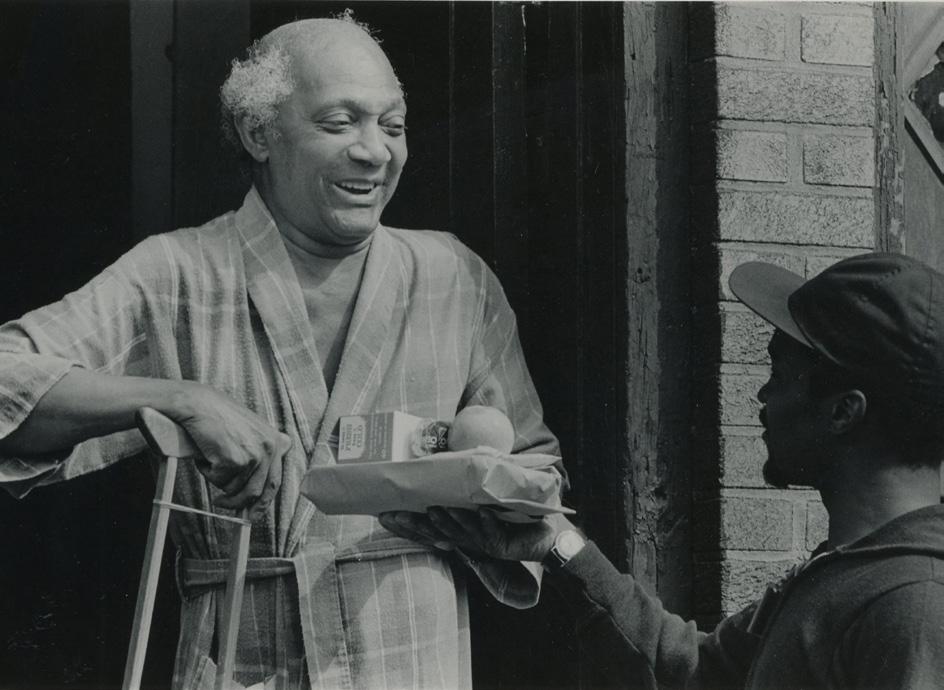

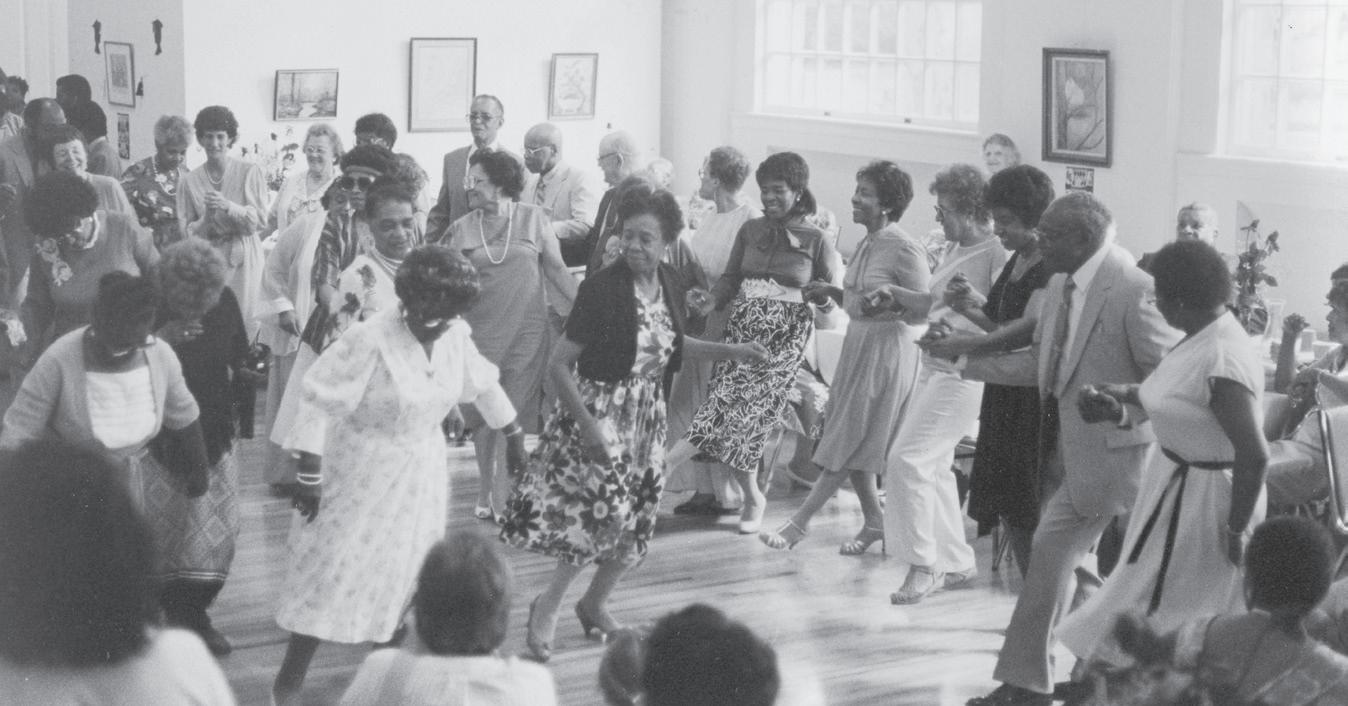
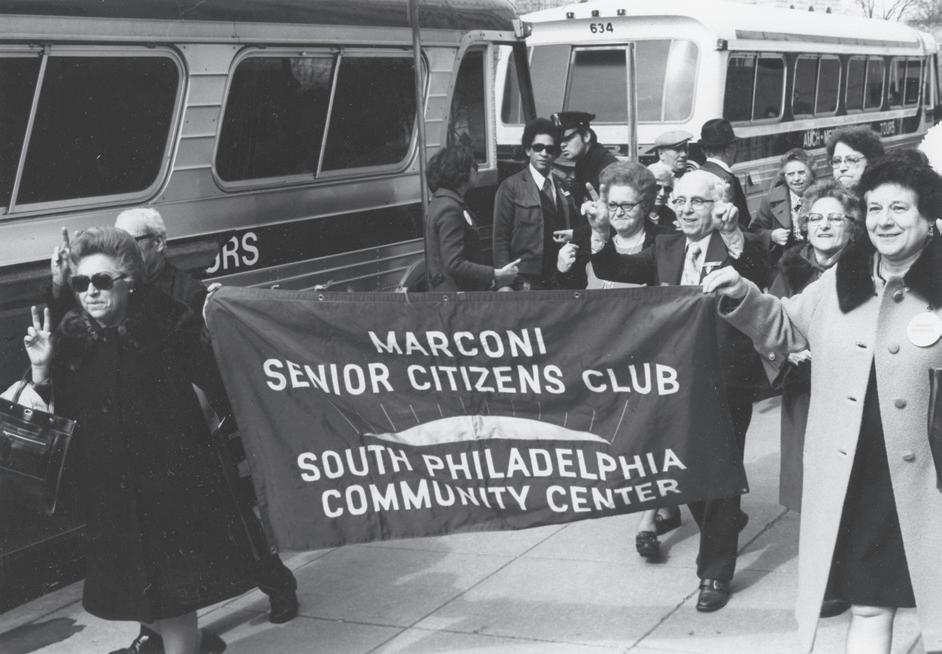


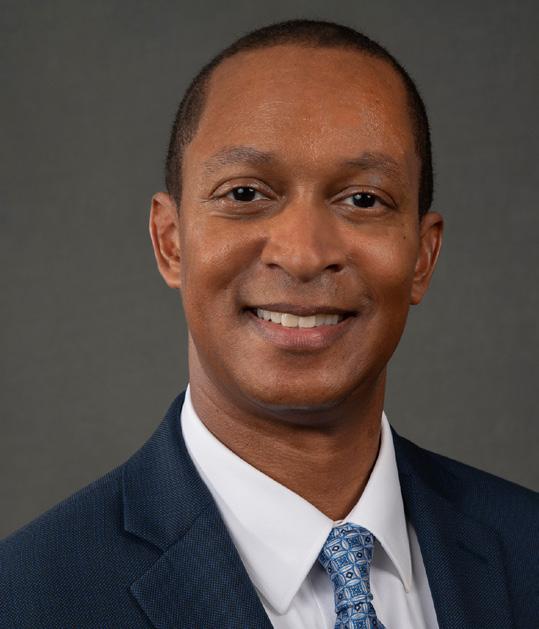

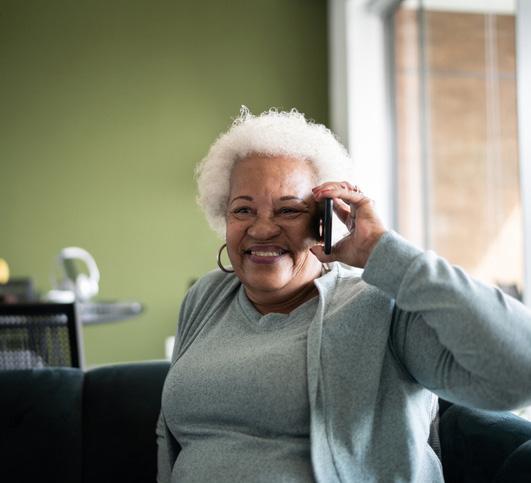

A Publication of January 2023 Free PCA Celebrates 50 Years of Aging with You! IN THIS ISSUE ADVOCATING FOR DISABILITY RIGHTS P5 Years of aging with you! PHILADELPHIA CORPORATION FOR AGING PHILADELPHIA CORPORATION FOR AGING PCA SERVES AS INVALUABLE COMMUNITY RESOURCE P6 LIBRARY TO EXPAND HOMEBOUND SERVICES P12
WHAT IS PCA?
Philadelphia Corporation for Aging (PCA) is a nonprofit agency dedicated to serving Philadelphia’s older adults and adults with disabilities. PCA publishes Milestones and offers:

• Care in the home
• Home-delivered meals
• Home repairs and modifications
• Protective services
• Senior centers
• Caregiver support
• Employment and volunteer programs
• Legal services
• Transportation
• Ombudsman services
• Health education
• Information and referral
For more information, call the PCA Helpline at 215-765-9040 or visit pcaCares.org.
PCA enters its 50th year of ‘Aging with You’
By Najja R. Orr, DBA, MBA PCA president & CEO
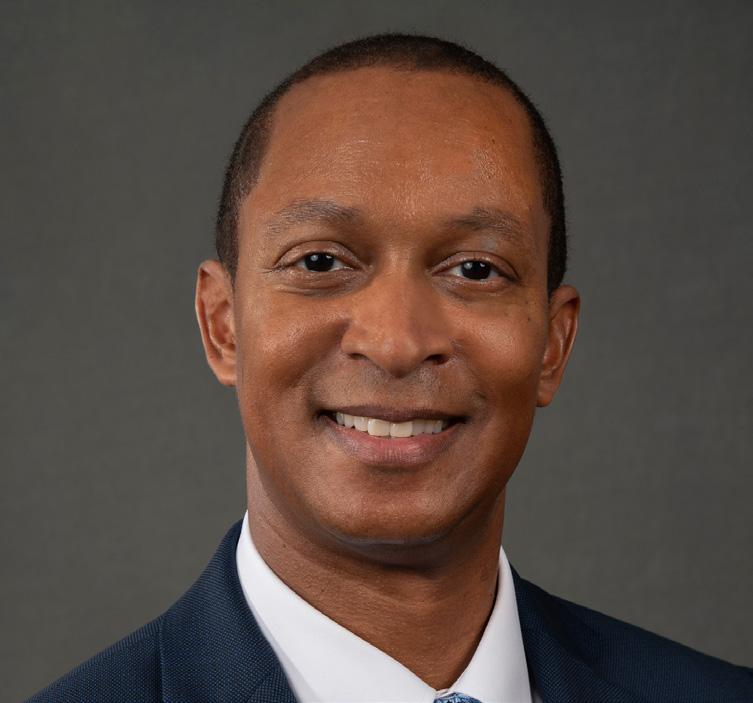
This year, Philadelphia Corporation for Aging (PCA) celebrates its 50th year of improving the quality of life for older Philadelphians and adults with disabilities. Our programs have helped millions of older adults and their caregivers to achieve their maximum level of health, independence and productivity.
PCA is proud to be part of the national aging network, which includes 56 State Units on Aging, 618 Area Agencies on Aging, nearly 20,000 service providers and 281 Tribal organizations, that collectively serve 11 million older Americans each year, according to the Administration for Community Living.

Older Americans Act
community centers. For more information about PCA’s programs and services for older adults and adults living with disabilities, call the PCA Helpline at 215-765-9040 or go to pcaCares.org.
The celebration begins
PCA Board of Directors 2022-23
Satya B. Verma, O.D., Chair
Glenn D. Bryan, Vice Chair
Angela Foreshaw-Rouse, Secretary
Louis A. Bove, Esq.
Nora Dowd Eisenhower, Esq.
Lynn Fields Harris
Katherine E. Galluzzi, D.O., FACOFP
Sandra McNally
Paul Nathanson
John Whitman
Eloise N. Young
Jacqueline S. Zinn, Ph.D.
Emeritus: Arthur E. Helfand, D.P.M.
Call 24/7 to report suspected elder abuse.
PCA Helpline: 215-765-9040
Outside Philadelphia toll-free: 888-215-765-9041 (TDD) pcaCares.org
Milestones is published monthly and distributed at more than 1,100 locations throughout Philadelphia, Lower Bucks and Eastern Montgomery counties.
Check us out online: pcaCares.org/Milestones
Editor: Alicia M. Colombo 215-765-9000, ext. 5081 PCA, 642 N. Broad St. Philadelphia, PA 19130
Email: MilestonesNews@pcaCares.org
Advertising: Teresa Heavens 215-765-9000, ext. 5053
Email: Teresa.Heavens@pcaCares.org
Subscriptions & Distributions: 215-765-9000, ext. 5081
Email: MilestonesNews@pcaCares.org
Home delivery: $12/year
The views expressed in Milestones are not necessarily those of Philadelphia Corporation for Aging (PCA). Milestones will not knowingly accept or publish fraudulent or misleading advertising. Milestones reserves the right to edit, revise or reject ads. Milestones assumes no responsibility for errors, misprints, omissions or misinformation; for failure to publish an ad; or for any damages of any kind. Neither the publisher nor any other party is rendering expert advice in this publication. No part of this newspaper may be reproduced without the permission of PCA.
©2023 Philadelphia Corporation for Aging. All rights reserved.
It all started on July 14, 1965, when President Lyndon B. Johnson signed the Older Americans Act (OAA) into law. This landmark legislation established a nationwide safety net of social services to support healthy aging for older adults. The OAA funds services and programs to help millions of older adults live and thrive in their homes and communities.
PCA was founded in 1973 when Area Agencies on Aging (AAAs) were formally established under the OAA as the local organizations charged with planning, developing, coordinating and delivering a wide range of long-term services and supports to local older adults. As the AAA for Philadelphia County, PCA works steadfastly to ensure the needs and preferences of older Philadelphians are addressed by an aging services delivery system that is tailored to our community. We support older adults who want to remain connected to their communities; need additional supports to stay safe in their homes and communities; and require advocacy and protection supports, including our older adult protective services, to mitigate and eliminate risk of elder abuse. The numerous OAA-funded services that PCA provides to older Philadelphians include inhome care, home-delivered and congregate meals, caregiver support, preventive health services, transportation, job training, elder abuse prevention and intervention, and senior
This issue of Milestones newspaper kicks off PCA’s 50th anniversary with a health brief detailing the latest OAA reauthorization (page 15), articles about PCA’s information and referral services (page 6) and plans for our 50th anniversary celebration (page 4). Each month throughout 2023, Milestones will include feature articles about various PCA programs and services, as well as interviews with prominent older Philadelphians.
PCA will also be marking “50 Years of Aging with You” with a full schedule of festivities to celebrate this milestone anniversary. We hope you will be able to participate with us. I am thrilled that veteran Channel 6 Action News broadcasters
Lisa Thomas-Laury and Vernon Odom will participate as our co-grand marshals for PCA’s 50th anniversary celebration. Stay tuned for further announcements!
PCA would like to thank you for supporting our mission to meet the critical needs of older Philadelphians. We appreciate your consistent support of PCA, especially during the recent COVID-19 pandemic. We are immeasurably better because of each of you and for that we are most grateful.
In the spirit of “Aging with You,” please remember to check in on family, friends and neighbors in need.
January 2023 Milestones 2
Published by Philadelphia Corporation for Aging
Najja R. Orr, DBA, MBA President and CEO
Funded by PCA
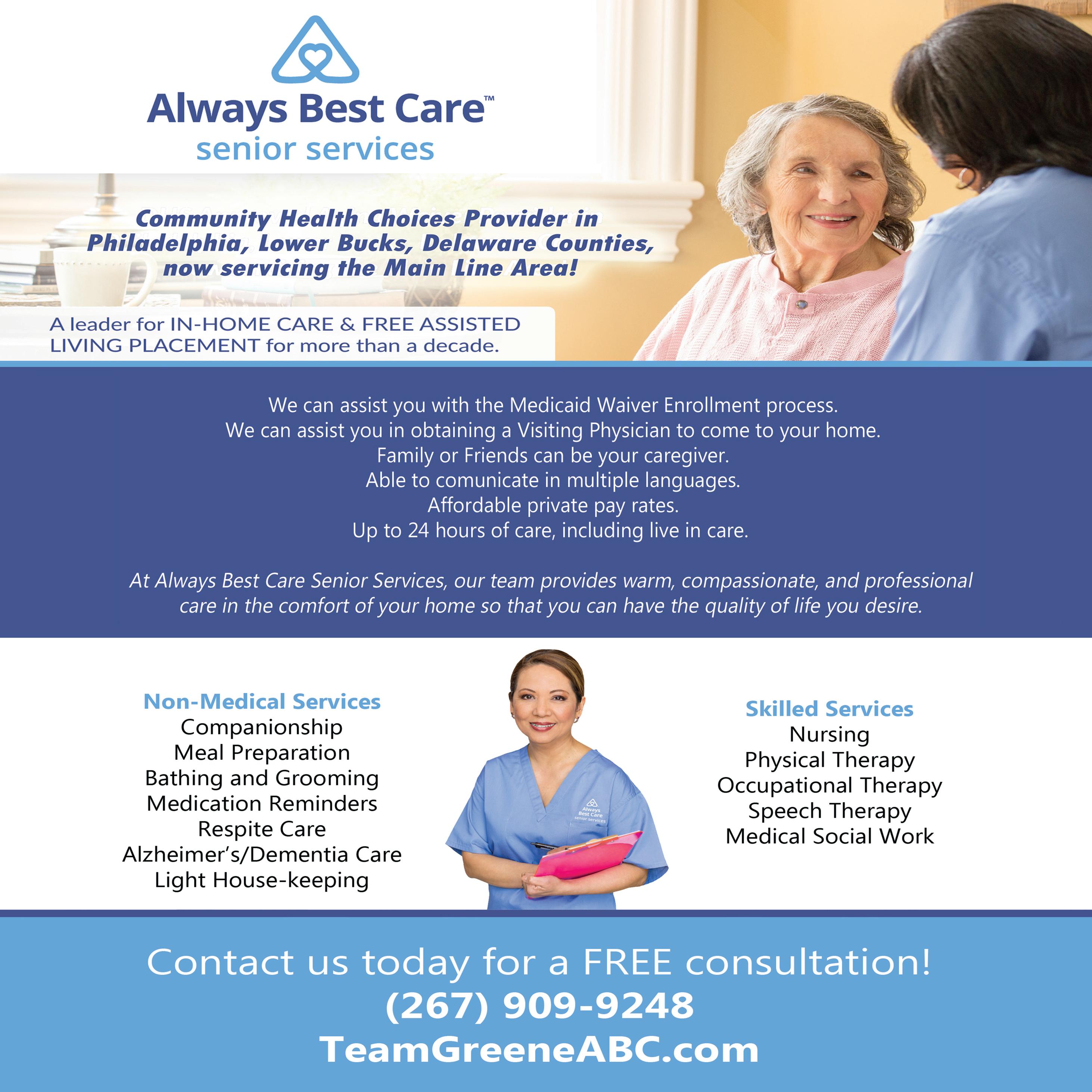
Grand marshals Vernon Odom and Lisa Thomas-Laury to lead PCA’s 50th anniversary celebration
King Jr.’s assassination when he was a radio reporter in Atlanta. From there, Odom covered various phases of the civil rights movement in the south and every presidential campaign from 1976 to 2016. During more than 40 years at WPVI-Channel 6, he reported on every major event in Philadelphia.
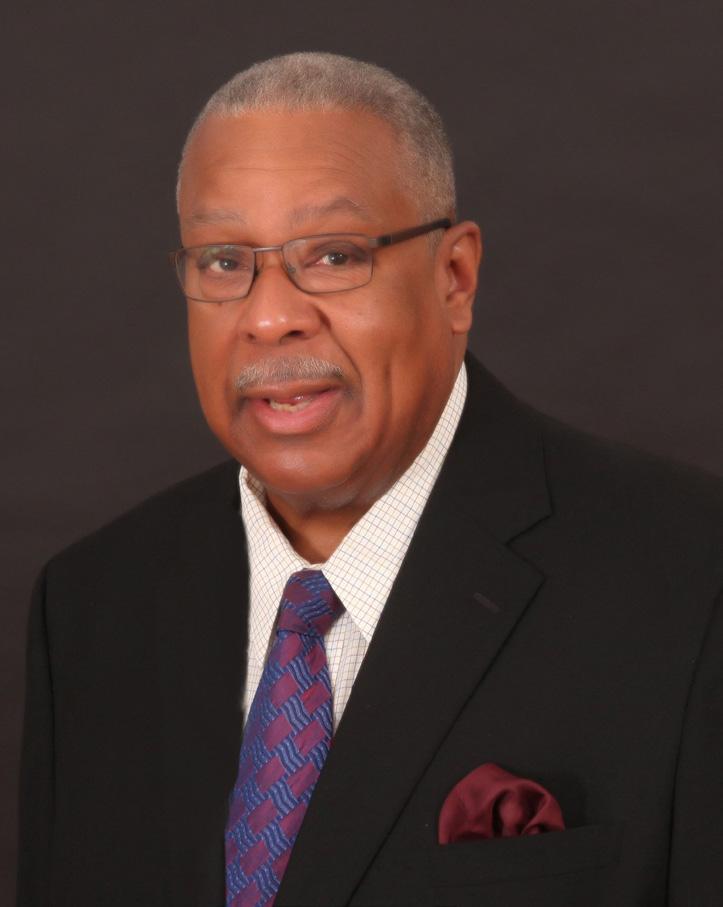 By Bill Conallen
By Bill Conallen
2023 marks the 50th year of Philadelphia Corporation for Aging (PCA) serving older Philadelphians and adults living with disabilities. In 1973, Rodney D. Williams, PCA’s first executive director, founded the agency with the vital mission of improving the quality of life for older Philadelphians and adults with disabilities, to assist them in achieving their maximum level of health, independence and productivity. PCA’s programs have come to encompass everything from in-home care and transportation to nutrition programs, health screenings and protective services.
To usher in PCA’s 50th anniversary, the agency has announced that two Philadelphia media icons will serve as grand marshals and add their unique perspectives on the impact PCA has made in the City of Brotherly Love: former Channel 6 Action News reporter Vernon Odom and anchor Lisa Thomas-Laury.
“Philadelphia is a city in dire need of advocates who are tirelessly focused on providing older adults the resources they need to ensure they are safe, happy and healthy in their homes,” said Odom. “This servant’s heart is one I saw everyday as a young man, when my father worked as a social worker in Akron, Ohio. I could not be more honored to champion this message during PCA’s 50th anniversary.”
Vernon Odom’s broadcasting experience dates back to Martin Luther
“Throughout my career, both reporting in Philadelphia and internationally, I have seen first-hand how the lack of adequate resources and social services can impact citizens both young and old,” said Odom. “PCA’s mission of serving older adults is one that is incredibly vital as our nation’s population ages and the need for advocacy and protection in support of older adults becomes even more important.”
Lisa Thomas-Laury is a retired Emmy award-winning news anchor who broke barriers by becoming one of the first Black TV journalists in the country. In 1978, she became the youngest news anchor in Philadelphia when she began working at the city’s ABC affiliate, WPVI-Channel 6 as a reporter and co-anchor of Action News at noon. In 1983, she started co-anchoring Action News at 5 p.m. and became a regular fill-in at the anchor desk for the recently retired Jim Gardner during the 6 and 11 p.m. newscasts. After 22 years at WPVI, Thomas-Laury faced a significant life challenge: a battle with POEMS syndrome, a rare nerve disorder that took two years to diagnose. Her diagnosis prompted her to author the book “On Camera and Off,” hoping to motivate others suffering from chronic illnesses to live their best lives and to help them navigate the challenging health care system.
“We could not be more thrilled to have such beloved figures in the Philadelphia area serve as our grand marshals for PCA’s 50th anniversary celebration,” said Najja R. Orr, DBA, MBA, PCA’s
president and CEO. “For decades, residents throughout the Delaware Valley have welcomed Vernon and Lisa into their homes and came to trust them for their skill, tact and professionalism.”
PCA’s origin
A great societal need necessitated an innovative approach to how our country provided for its older adult population. Thus in 1965, the federal Older Americans Act (OAA) was created due to major concerns for the needs of the growing older adult population. It was the first major federal legislation to organize and deliver community-based social services to older adults.
PCA was created in 1973 when the first reauthorization of the OAA created a network of Area Agencies on Aging (AAAs) to deliver vital homeand community-based programs. Today, there are more than 600 AAAs throughout the U.S. that provide OAA programs to older adults in their communities. Federal AAA oversight and allocation of OAA-authorized funds is conducted through the Administration for Community Living (ACL).
To commemorate the agency’s growth alongside the changing landscape of the
city it calls home, PCA has many events planned throughout the year. As grand marshals, Odom and Thomas-Laury will illustrate how PCA’s mission and vision have grown with the city and the older adults it serves on a daily basis.
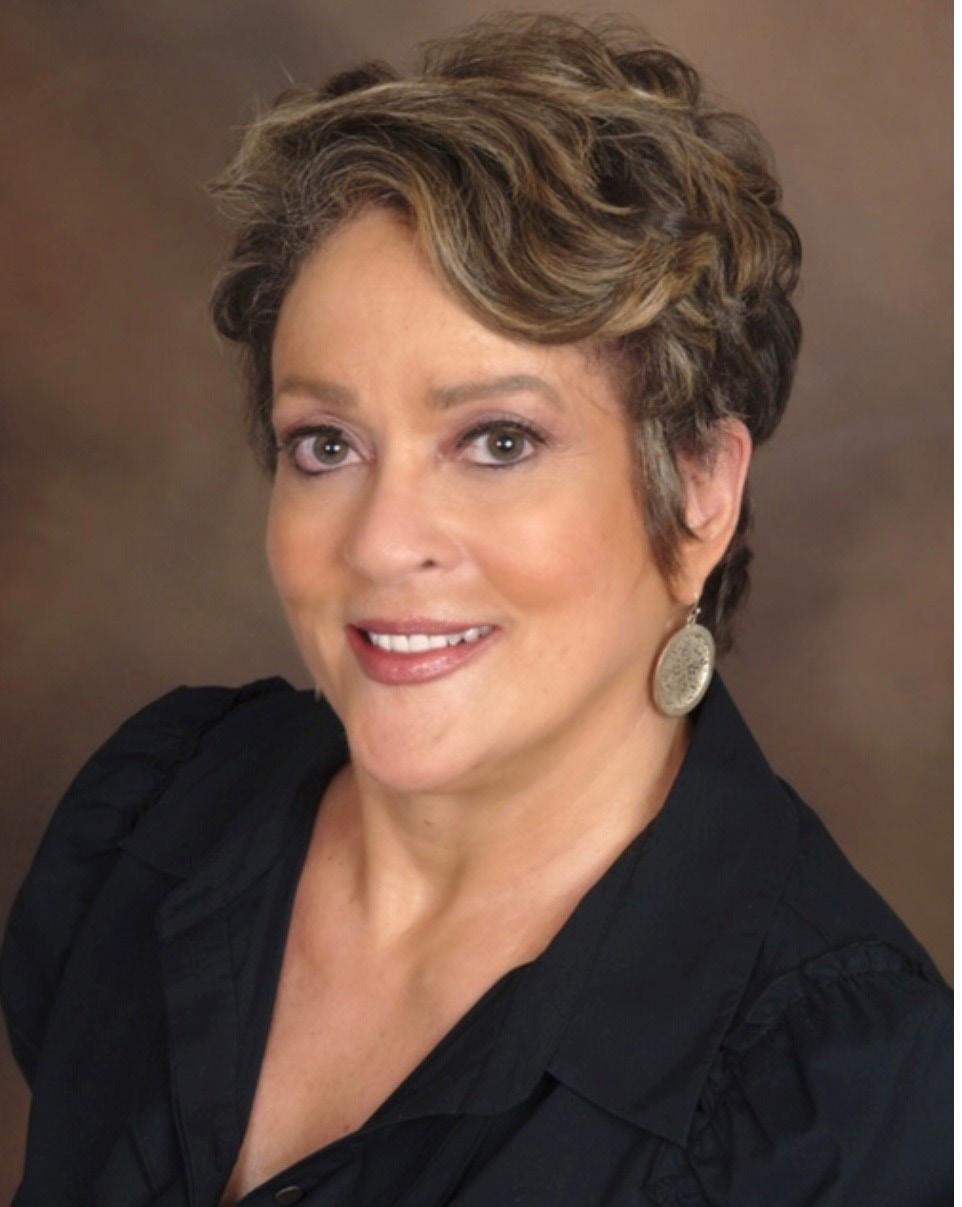
“Philadelphia as a city has changed quite a bit since my career in journalism began many years ago,” said Odom. “Many of the challenges from poverty, lack of adequate resources and safety concerns, however, remain just as prevalent today as they were when I first came to this great city. My goal as grand marshal is to tell the story of how PCA has steadfastly advocated on behalf of older adults throughout the city during the past 50 years to address some of the pressing issues affecting their communities, while also having a vision for the future.”
Those interested in learning more about PCA’s 50th anniversary or upcoming events highlighting the agency’s work over the past five decades can visit pcaCares.org. For information about PCA’s programs and services, call the PCA Helpline at 215-765-9040.
January 2023 Milestones 4
Bill Conallen is the public relations specialist at Philadelphia Corporation for Aging.
Years of aging with you!
PHILADELPHIA CORPORATION FOR AGING
People living with disabilities have strong advocates in Philadelphia
By Jay Nachman
Full inclusion for people living with disabilities is a two-way street, between agencies supporting those who are disabled, and the public advocating and being supportive of full inclusion, according to Shane Janick, executive director of The Arc of Philadelphia.
Based in North Philadelphia, The Arc’s mission is to advocate with and for all children and adults living with intellectual and developmental disabilities and their families, as well as to promote active citizenship, selfdetermination and full inclusion.
Janick was inspired to enter the field by his older brother Dave, who lives with an intellectual disability and other medical complexities.
Individuals can advocate for people living with disabilities by promoting inclusion in all aspects of life. For example, by promoting inclusive hiring practices and providing supportive employment for people with disabilities in workplaces. There is also the importance of supporting home- and community-based services that people living with disabilities utilize for their independence.
On an individual level, Janick said, “For the most part that comes down to civility and etiquette, being aware of what’s appropriate and what’s not necessarily appropriate when it comes to conversations and interactions with people. And that’s changed a lot over time for the better.”
In the past, he said, people living with disabilities may not have gone to the movies or social settings because of the negative experiences they would encounter, like being stared at or being treated differently. Another negative experience would occur when a person living with a disability would go out with a support staff person and the people they encountered would talk to that person rather than the person with the disability.
Over time Janick has seen much more acceptance and understanding by the public and more active promotion of full inclusion. “All that’s shifting for the better,” he said. “We don’t see too much of the (negative) public attitude (anymore). But we still have a lot of work to do as far as the practices that can promote those interactions.”
For support, the City of Philadelphia’s Department of Behavioral Health and Intellectual disAbility Services (DBHIDS) facilitates applications for an array of services and programs that people living with disabilities can access that are not directly related to health care services, such as home- and community-based support staff; respite for family members; and employment, transportation and residential services.
DBHIDS waiver programs are available to support eligible individuals living with disabilities over many stages of their lives. There is no cost to the participants or their families.
Janick noted that disability shouldn’t be a niche topic, a conversation only held within the disability community. One in four people in the United States identifies as having a disability, according to the Centers for Disease Control and Prevention. A large number of those disabilities are related to aging, he said.
The Legal Clinic for the Disabled (LCD), located in Center City, works to promote inclusion, independence and justice for individuals living with
disabilities by providing free legal representation to overcome legal obstacles that would otherwise affect their independence, health or quality of life.

As an example, a parent or grandparent may be going through a custody dispute and the other side tries to inappropriately use the disability as a negative factor against that person. Lawyers at the clinic challenge that bias and remind the court that people living with disabilities are often perfectly capable of adapting and providing for their child or grandchild’s needs, said Theresa Brabson, the clinic’s legal director.
In the landlord/tenant context, Brabson said, the clinic sees a lot of landlords take advantage of tenants by assuming tenants don’t know their rights or how to exercise them. The LCD has seen a few instances where landlords have not made repairs on steps that were completely disintegrated.
“It was unsafe for people to get in and out of their houses, so they were essentially homebound, not because of their disability, but because maintenance issues actually prevented them from exiting their homes,” Brabson said. “We also receive calls about elevator problems that directly impact an individual’s safety and wellbeing.”
Milestones wants to hear from
We welcome your story ideas, feedback and suggestions. (Story-specific comments or questions will be forwarded to the writer.) Submissions of letters or articles for publication must be signed and dated and include your address and phone number. Submission constitutes permission to edit and publish in any form or medium.
The LCD is a partner agency of the Philadelphia Eviction Prevention Project, which assists approximately 1,800 tenants each year who are facing eviction through legal representation, financial counseling, a live hotline, a court help center, community trainings and educational materials.
“We work to proactively educate and advocate for our clients,” Brabson said. “We want to empower people to do what they can on their own. But often having a professional advocate who can help address the issue so they don’t have to go it alone makes a difference. Please reach out. That’s why we’re here.”
***
For information and assistance:
• The Arc of Philadelphia | 215-2294550 | ArcPhiladelphia.org
• Legal Clinic for the Disabled | 215587-3158 | lcdPhiladelphia.org
• City of Philadelphia’s Department of Behavioral Health and Intellectual disAbility Services | 1-888-545-2600 (24/7 nonemergency hotline) | dbhids.org

Send ideas, comments & submissions to:
Attn: Milestones Editor PCA, 642 N. Broad St. Philadelphia, PA 19130 Email: milestonesnews@pcaCares.org
PCA reserves the right to not publish any submission; receipt may not be acknowledged; and submissions will not be returned.
January 2023 Milestones 5
Jay Nachman is a freelance writer in Philadelphia who tells stories for a variety of clients.
YOU!
PCA serves as invaluable community resource and advocate for older adults
to trust the institution engaging them and seeking to improve their lives,” said Mitchell.
By Bill Conallen
Much concern and confusion often exist regarding exactly how older adults can go about obtaining the resources they may need to ensure that they can maintain a level of independence which preserves dignity and/or promotes growth. Information and referral programs, offered through Philadelphia Corporation for Aging (PCA) help people identify, understand, and effectively connect to a broad range of programs that will address their needs for services and support to help them age well at home and in the community.
Congress passed the Older Americans Act (OAA) in 1965 after policymakers raised concern about the lack of community social services for older adults. The law established the Administration on Aging (AoA) to administer new grant programs and to oversee government programs for older people. Among the first services under the OAA were information and referral programs offered by local Area Agencies on Aging, including PCA in Philadelphia County. These services aim to help older adults, adults with disabilities and caregivers connect to needed programs and resources within their communities.
“Older adults who are in need of answers and help often do not know where to begin, so they may not get the assistance they require, or they may waste a lot of time searching through various websites or calling multiple agencies with mixed results,” said Wanda Mitchell, PCA’s director of community engagement. “Thanks to services offered through PCA, older people can receive the information they need from a trusted community advocate.”
Under the leadership of Mitchell, PCA’s Community Engagement Department maintains an active presence in Philadelphia County, representing PCA at more than 350 events, including health fairs, senior expos, faith-based gatherings, community events and block parties, each year. Through this outreach, the agency shares information about home- and community-based programs, including transportation, nutrition, senior community centers, volunteer and employment services, legal, ombudsman, and health promotion initiatives offered through PCA.
“Our department performs an essential role in advising our consumers about the resources at the disposal of PCA. After all, the better and more accurately informed and involved our community is, the more likely they are
Another vital resource that connects older adults, caregivers, professionals and the public with information about and referral to programs and services for Philadelphians who are age 60plus or who have disabilities is PCA’s Helpline. Each year, PCA Helpline staff connects more than 100,000 Philadelphians with the resources they need by coordinating transportation services, taking reports of suspected elder abuse, making referrals for care management and home repairs, and administering crisis grants from the Emergency Fund for Older Philadelphians.
“The most common calls we get are general questions from concerned citizens looking for more information about the services that PCA provides,” said Nolan Lawrence, PCA Helpline Director. “We also often assist older adults with issues related to financial abuse, as well as other protective services concerns. Our team of 30 dedicated and knowledgeable specialists and supervisors undergoes a rigorous training process to excel in their positions and the department has operated with this commitment to service since PCA was established in 1973.”
The PCA Helpline gives callers information about resources available both through PCA and outside agencies, including the City of Philadelphia. Resource referrals can be anything from home-delivered meals to legal services to financial benefits. If a Heat Health Emergency is declared for Philadelphia County, the PCA Helpline becomes the City’s Heatline to counsel callers of all ages about precautions to take against the heat and detecting signs of heat stress.
“Services, such as the Helpline, are a prime example of the indispensable advocate PCA continues to be for older Philadelphians when it comes to edu-
cation and outreach,” said Lawrence. “Connecting older adults with information and services is the Helpline’s mission. We are the front door of PCA and take this role to heart.”
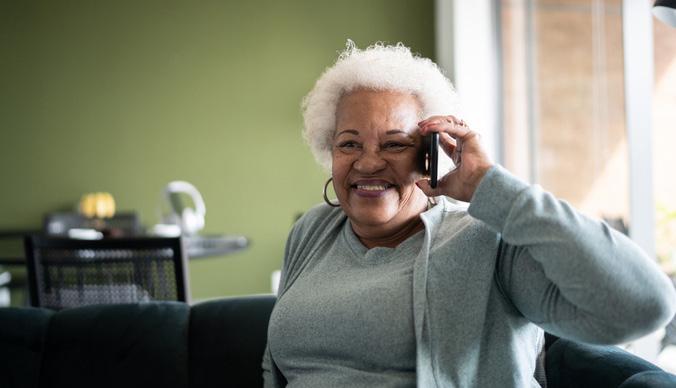
The Older Americans Act mandate also extends to policy advocacy and pertains to issues impacting the older adult population. PCA has long worked as an advocate for appropriate funding to meet the needs of older adults, including for home-and community-based services. This in turn supports the agency mission of consistently informing it’s consumers of the tools and resources at their disposal to enrich their lives as they grow older.
“As an Area Agency on Aging it is important to communicate with and educate leaders about PCA programs and services, as well as the importance of social connections and efforts to decrease isolation among vulnerable populations,” said Gail Garrett, PCA’s legislative affairs manager. “With so many concerns top of mind for legislators and their staff about what needs to be done on behalf of their constituents, a large part of my role is to advocate for older Philadelphians by informing leaders of needs and the services available through PCA.”
PCA’s information and referral mandate seeks to empower individuals to make their own choices when they are searching for support and services. The agency’s role is not only education, but also affirmation, collaborative planning and problem solving. Anyone seeking information or referral to a service or program can call the PCA Helpline at 215-765-9040. For general inquiries, call weekdays from 8:30 a.m. to 5 p.m. Confidential reports of suspected elder abuse can be made 24/7. Information can also be found on PCA’s website at pcaCares.org
January 2023 Milestones 6
Bill Conallen is the public relations specialist at Philadelphia Corporation for Aging.
Home heating safety tips
Did you know that heating equipment is one of the leading causes of home fire deaths? Half of home heating fires are reported during the months of December, January and February. Take heed of these safety tips and precautions from the National Fire Protection Association. Be warm and safe this winter!
• Keep any combustible items or materials at least three feet away from heating equipment, including the furnace, fireplace, wood stove or space heater.

• Never use your oven to heat your home.
• Have a qualified professional install or repair stationary space heating equipment, water heaters or central heating equipment according to the local codes and manufacturer’s instructions.
• Have heating equipment and chimneys cleaned and inspected every year by a qualified professional.
• Always turn space heaters off when leaving the room or going to bed.

• Always use the right kind of fuel, specified by the manufacturer, for fuel-burning space heaters.
• Make sure the fireplace has a stur-
dy screen to stop sparks from flying into the room. Let the ashes cool, then place them in a metal container.
• Install wood burning stoves following manufacturer’s instructions or have a professional do the installation. All fuel-burning equipment should be vented to the outside.
• Install and maintain carbon monoxide (CO) and smoke alarms on every floor of your home, including the basement. Test these alarms at least once a month and replace the batteries twice a year.
• If you smell gas in your gas heater, do not light the appliance. Leave the home immediately and call your local fire department or gas company.
For more fire safety tips, go to nfpa. org/education. Philadelphia homeowners can request to have free smoke alarms installed by the Philadelphia Fire Department by calling 311. Apartments and rented homes are required to have smoke alarms installed by the landlord.
January 2023 Milestones 7
(See page 15 for crossword)
Events
January 2023
JANUARY 1
NEW YEAR’S DAY
Send your calendar items to MilestonesNews@pcaCares.org by the 25th of the month (for publication in month after next) Questions? 215-765-9000, ext. 5081

JANUARY 6
FIRE SAFETY & FALL PREVENTION
Learn tips to keep you safe at home. 2 p.m. Northeast Regional Library. 215685-0522 | Free

JANUARY 9
GENTLE YOGA

Improve strength, balance & flexibility. 11 a.m. to 12 p.m. Journey’s Way. 215-4871750 | Free
JANUARY 4
ADULT NUTRITION WORKSHOP
A registered dietitian will discuss healthy lifestyles & how to build a sustainable food system. 1:30 p.m. Walnut Street West Library. 215-6857671 | Free
JANUARY 4
PROSTATE HEALTH
Representatives from Jefferson Health discuss prostate screening best practices for older men. 10-11 a.m. Philadelphia Senior Center. 215-5465879| Free
JANUARY 5
BINGO
12:30 p.m. Raymond & Miriam Klein Center. 215-698-7300, ext. 193 | $0.25 per game
JANUARY 6
THREE KINGS CELEBRATION
Festive music, food & a raffle. 9:30 a.m. to 1 p.m. Norris Square Senior Community Center. 215-423-7241 | Raffle tickets: $5
JANUARY 9
COMPUTER LESSONS
Learn basic computer skills & applications. 3:30 p.m. South Philadelphia Library. 215-685-1866 | Free
JANUARY 11
CHRONIC DISEASE MANAGEMENT
Learn disease-management skills, including decision-making, problemsolving & action planning. 11 a.m. to 12 p.m. Philadelphia Senior Center. 215546-5879| Free

JANUARY 11
CERAMIC CREATIONS
10-11 a.m. Star Harbor Senior Community Center. 215-727-0100 | $2
JANUARY 13
CITY & STATE BENEFITS
A representative from Community Resource Corps helps residents connect to vital services. 1-4 p.m. Logan Library. 215-685-9156 | Free
January 2023 Milestones 8
JANUARY 16
MARTIN LUTHER KING JR. DAY

JANUARY 18
ISRAELI DANCE CLASS
Exercise, learn new moves & make friends. 12:30-2 p.m. Raymond & Miriam Klein Center. 215-698-7300, ext. 193 | Free
JANUARY 22
CHINESE NEW YEAR

JANUARY 25
WORDS OF WISDOM
Coffee & an enlightening lesson in Jewish ethics. 10 a.m. The Congregations of Shaare Shamayim. 215-677-1600 | $12
JANUARY 27
STAMP COLLECTING

For anyone interested in starting or building a stamp collection. 1-2:30 p.m. Journey’s Way. 215-487-1750 | Free
JANUARY 16
MARTIN
LUTHER KING JR. DAY OF SERVICE
Take part in the largest MLK service day event of the nation that includes more than 150,000 volunteers each year. Register: mlkdayofservice.org | 215-8511811
JANUARY 17
FITNESS CLASS
Low-impact exercise program to help people with chronic conditions stay active. 10 a.m. Juniata Park Older Adult Center. 215-685-1490 | Free

JANUARY 23
INTRODUCTORY
JEWELRY WORKSHOP
Learn how to design & study a variety of chains, beads, necklaces, bracelets & assorted metals. 12:30-2 p.m. Raymond & Miriam Klein Center. 215-698-7300, ext. 193 | $5
JANUARY 24
HOUSEPLANT & GARDENING GROUP
Join library staff & Sisters of the Earth for plant swaps, cultivating conversations, plant-related crafts & horticultural literature. 11 a.m. Wynnefield Library. 215-685-0298 | Free
JANUARY 24
NUTRITION CLASS
Get the basics on how to keep a happy, healthy & nutritious diet during the frigid winter months. 12:30-1:30 p.m. Philadelphia Senior Center. 215-546-5879| Free
JANUARY 28
DATA PRIVACY DAY
JANUARY 29
TOGETHER OFF BROADWAY
Go behind the Broadway curtains for a look at the personal lives & acclaimed song list of two superstars: Merman & Martin. 2 p.m. The Congregations of Shaare Shamayim. 215-677-1600 | $36
JANUARY 30
CLAY CLASS
Fun, informal class guides participants in form, function & surface treatments to create beautiful ceramic pieces. 10 a.m. Juniata Park Older Adult Center. 215685-1490 | $5
January 2023 Milestones 9
Hospice provides meaningful time together
ones and patients a comfortable environment for when symptoms can no longer be managed at home. With on-site, around-the-clock nursing care, caregivers have the peace of mind that their loved ones are well cared for. Patients who are admitted to inpatient hospice care may return home if symptom management improves.
Respite care is inpatient hospice care on a short-term basis. Respite care preserves the dignity of the patient while giving caregivers much-needed time to rest and recuperate.
Myths
By Mary Anna Rodabaugh
When you think of “hospice,” you may picture end-of-life care provided in a facility. However, hospice isn’t a place, nor is it a last resort for patients. Hospice is a type of medical care that gives seriously ill patients with a life-limiting illness and their families meaningful time together.
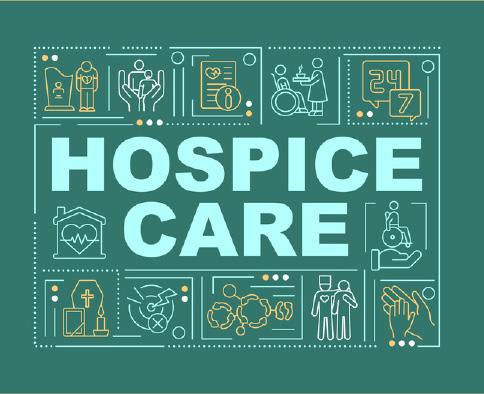
Hospice care begins when the focus of care shifts from active treatment to comfort and symptom management for the patient’s quality of life.
“Earlier access to hospice care results in reduced rehospitalizations,” says Thomas Mignone, general manager of VITAS Healthcare. “Evidence also suggests that it decreases acutecare utilization and lowers health care costs.”
Hospice care gives patients and their caregivers a sense of control, while also easing discomfort from serious or terminal health conditions. When
it comes to hospice, there is no “onesize-fits-all,” approach. In fact, there are four levels of hospice care available.
Hospice levels
Hospice care at home is a level of care intended to help maintain the patient’s comfort level and quality of life. Routine visits are made to the home where the patient resides. Hospice care at home can include spiritual and emotional support for caregivers, assistance with small tasks, therapeutic services, and medication administration and maintenance. Care equipment may also be provided.
Continuous hospice care provides around-the-clock care to help manage a patient’s acute symptoms. Often used when a patient experiences a medical crisis, this level focuses on intensive symptom management.
Inpatient hospice care gives loved
“There are several misconceptions about hospice, and one of the most common is that hospice is meant for the last week of life,” Mignone says. “In fact, it’s often that we hear families say, ‘We wish we had known about hospice sooner.’”
Mignone notes that hospice is for seriously ill patients who, according to a physician, have six months or less to live if their advanced illness continues its normal trajectory. There is no limit to the amount of time a patient can receive hospice care. Beginning hospice earlier in a patient’s care journey can provide caregivers and patients with stress relief and more meaningful time together.
Hospice is not limited by illness. It is not just for patients with cancer. Hospice can provide comfort for patients with chronic obstructive pulmonary disease (COPD), stroke, amyotrophic lateral sclerosis (ALS or Lou Gherig’s disease), kidney failure, multiple sclerosis and other conditions.
Another misconception is that hospice is permanent. Patients who enroll in hospice care may see improvement in their symptoms. Caregivers
and patients can choose to stop hospice care at any time and restart if comfort management is needed.
Hospice care is a fully covered benefit under Medicare for Medicare-approved hospice programs. Patients are eligible to receive medical equipment and supplies through hospice, including oxygen tanks, hospital beds, toileting supplies and shower chairs.
Benefits
Mignone reminds patients and caregivers that hospice offers psychosocial care that other health entities do not. This includes team support from a variety of disciplines, such as a social worker, chaplain and bereavement specialist, in addition to clinicians including a nurse, physician and aide. With the holistic care and support of a full team, quality of life improves as time increases on hospice care.
Hospice care provides patients the ability to manage their life-limiting illness with dignity and respect while optimizing comfort. It is not just for those nearing the imminent end of life. Hospice can also help relieve the stress that caregivers experience by offering them respite while still including them in the patient’s daily care.
***
For more information, contact VITAS Healthcare at 1- 855-9552624 or vitas.com. To inquire about hospice programs in Philadelphia, call the PCA Helpline at 215-7659040.
January 2023 Milestones 10
Mary Anna Rodabaugh is a writer, editor and writing coach.
Bringing College Students and Older Adults Together
By Mary Anna Rodabaugh
Intergenerational friendships are immensely valuable for both college students and older adults. It can be a time to share stories of the past and future, learn new things, and reduce loneliness for both parties. If you are interested in activities or services brought to you by local college students, there are several programs in Philadelphia and the region to consider.
Temple University’s Intergenerational Center (IGC) offers the Time Out program in co-ordination with Penn Memory Center, which facilitates meaningful, in-home engagement through intergenerational companionship by connecting older adult individ-
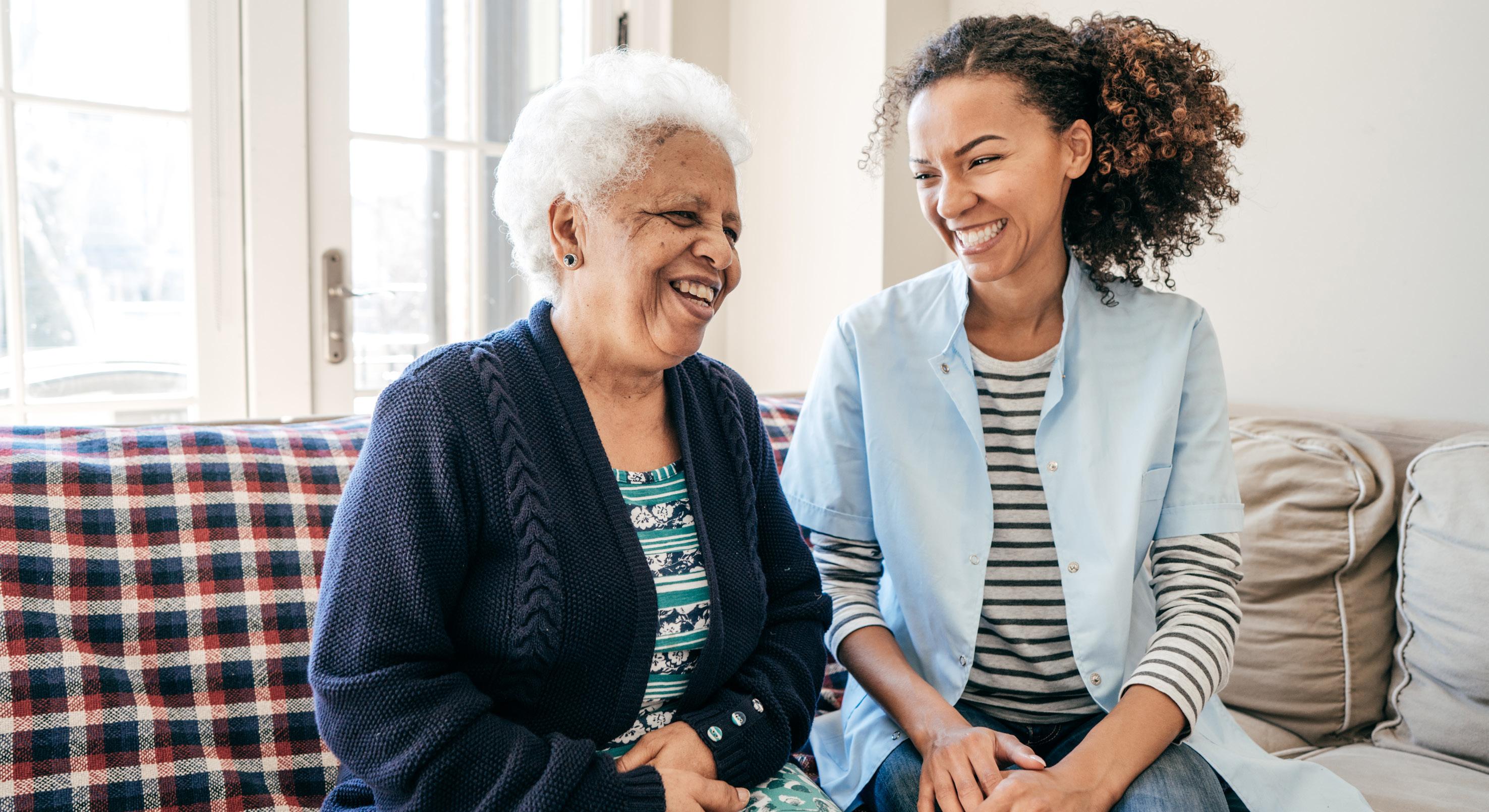
uals with trained college students. Activities include conversation, reading and light activities at the home. Personal care, such as bathing, dressing, feeding, toileting, and administering medications or therapies, is not provided.
Family Friends is another program of Temple’s IGC that provides voluntary, community outreach to eligible, kinship households and additional families citywide who have special needs. Families are enrolled in the program free of charge.
Penn Memory Center offers Time Together, a community-based program where Philadelphia college students provide high-quality, low-cost respite care to families supporting an older
adult, including those with physical or cognitive impairments.
Weekly Smile, another free program of Penn Memory Center, matches college students and older adults for weekly connections to share stories and advice, work together on art projects, and enjoy other common interests. Weekly connections can occur through video or phone calls.
Widener University and West Chester University offer the Intergenerational University Connections program in partnership with the Pennsylvania Department of Aging. University students participate in weekly virtual conversations and activities with older adults. The sessions last about one hour and occur for 10 weeks.
Resources
Temple University’s Intergenerational Center Time Out program: email timeout@temple.edu
FamilyFriends at Temple University: call 215-204-5544 or visit education.temple. edu/igc
Time Together at Penn Memory Center: call 215-662-7810 or go to PennMemoryCenter.org/time-togetherin-person-services
Intergenerational University Connections program through the PA Department of Aging: email aging@ pa.gov.
Mary Anna Rodabaugh is a writer, editor and writing coach.
January 2023 Milestones 11
A healthy twist on an old favorite
Eating healthier doesn’t mean sacrificing flavor. By adding more vegetables to your meals and using a variety of spices, you cut fat and calories while still enjoying delicious meals. This month’s recipe is a healthier version of a popular Asian dish: pad Thai. Substituting the traditional rice noodles for spaghetti squash reduces 150 calories and 32 carbs per cup.
Spaghetti Squash Pad Thai

Ingredients:
1 medium-sized spaghetti squash (about 3-4 lbs.)
7 tbsp. neutral-flavored oil, such as canola or vegetable oil
Kosher salt
Freshly ground black pepper
3 eggs
1 package (8 ozs.) firm tofu, finely diced (about 1 cup) OR thinly sliced chicken, beef, pork or shrimp
1 large red onion, thinly sliced
6 cloves garlic, finely minced
2 cups carrots, cut into tiny matchsticks
2 cups bean sprouts
2 bunches scallions, sliced
6-8 tbsp. Pad Thai sauce (see below)
3/4 cup peanuts, chopped
1 lime, cut into wedges
Sauce:
2 tbsp. light brown sugar
2 tbsp. fish sauce
2 tbsp. rice vinegar or distilled white vinegar
1 lime, juiced (should yield about 1 tablespoon)
2 tbs. tamarind nectar (sold in international foods section of grocery story)
1 clove garlic, minced
Optional: red pepper flakes
Directions:
Combine sauce ingredients in a small saucepan over medium-low heat. Cook sauce, stirring occasionally, until brown sugar is completely dissolved. It should yield about 8 tablespoons of sauce.
Meanwhile, preheat oven to 400°F. Cut the spaghetti squash in half with a large, sharp knife. Remove seeds and stringy guts, then brush the cut
sides of the squash with 1 tablespoon of oil. Season with salt and black pepper. Place spaghetti squash, cut side down, on a baking sheet and roast until tender and easily pierced with a knife, about 45-60 minutes.
Let the cooked spaghetti squash cool for about 5 minutes, then scrape all the flesh with a fork to resemble strands of spaghetti. Taste and season with some more salt and pepper, if needed.
Heat 3 tablespoons of oil in a wok or large skillet over high/medium-high heat. When oil is hot, add tofu or meat and cook, stirring frequently, for 3-4 minutes. Remove from pan and set aside.
Add remaining 3 tablespoons of oil to the pan. Once hot, add red onions and cook for 1 minute. Add garlic and cook for 1 minute, stirring constantly to avoid burning. Add carrots, bean sprouts, and scallions to pan and cook for 1 minute. Return the cooked tofu or meat to the pan with 6 tablespoons of sauce and stir.
Move the mixture to one side of the pan, crack the eggs and add them to the empty side. Scramble eggs with a wooden spoon and cook until just set, about 30 seconds. Combine into the Pad Thai mixture.
Add cooked spaghetti squash and gently toss everything together, then cook for 1-2 minutes. If you like more flavor, stir in the remaining 2 tablespoons of sauce. Serve immediately with lime wedges and chopped peanuts.
Source: Shared Appetite
January 2023 Milestones 12
Free Library receives $200,000 grant from City to expand to homebound services
The Central Senior Services division of the Free Library of Philadelphia, located in the Parkway Central Library at 1901 Vine St., First Floor West, administers the library’s Homebound Services. The program delivers books, movies, music and other materials to
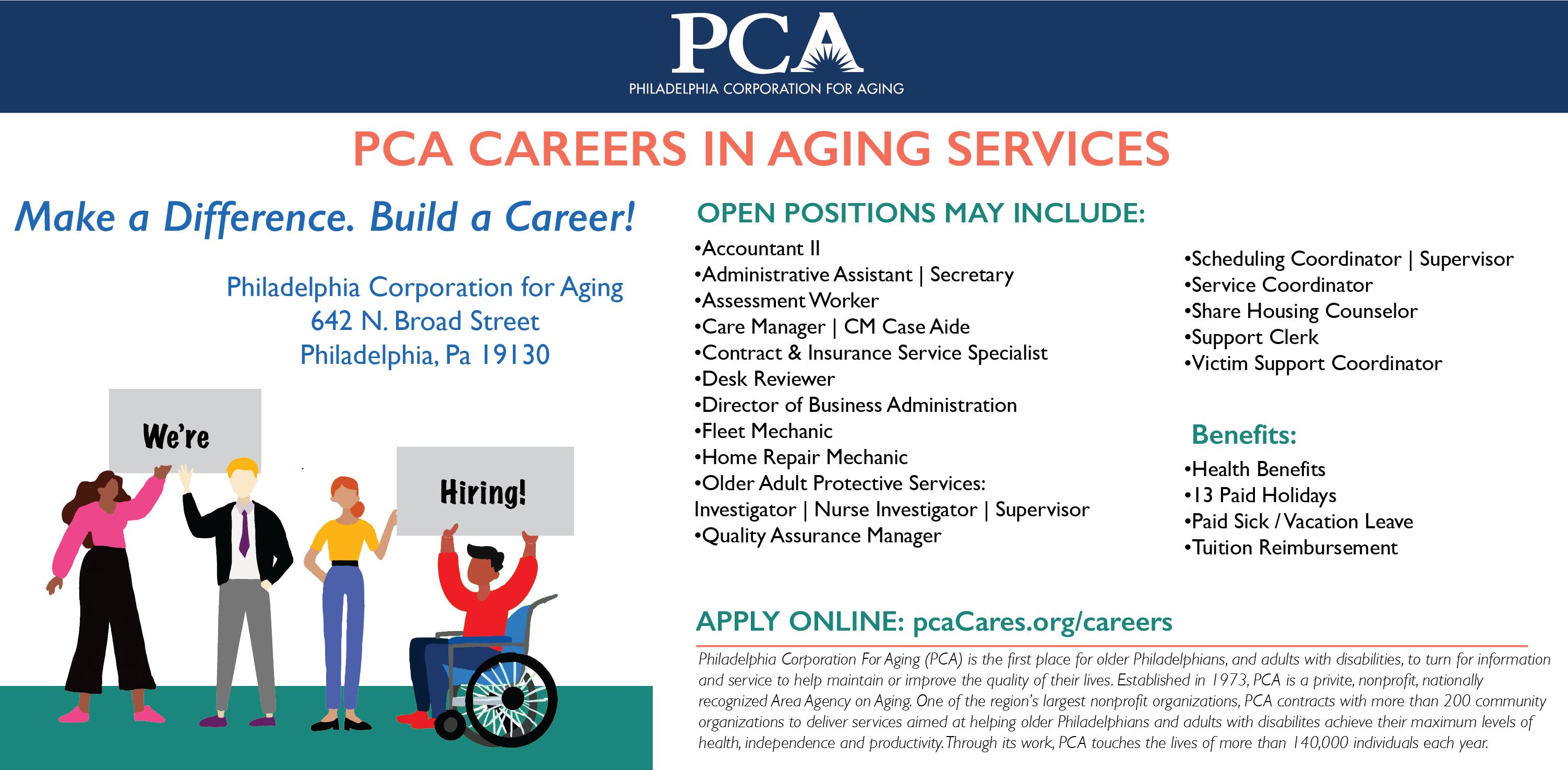
older Philadelphians who, due to illness or disability, cannot visit a neighborhood library.

For many years, the Homebound Services program has been run as a partnership between the Free Library of Philadelphia and the U.S. Postal Ser-

vice (USPS), which delivers materials to individuals who are homebound and returns them to the library. In recent years, the wait time to receive materials has increased significantly due to financial constraints within the USPS. These shipping delays have impacted the library’s ability to adequately serve Philadelphia’s older adults who are homebound.
To resolve this issue, the Free Library applied for – and has been awarded – a $200,000 grant from the Mayor’s Innovation Fund to re-invent the Homebound Services program. The funding will allow the Free Library to purchase a dedicated delivery vehicle and to hire two part-time drivers/community outreach staff members.
“For the first time in the history of this program, we will be able to deliver material to our own clients and sig-
nificantly reduce the time that patrons have to wait to receive their books, movies, music and other items,” said Richard “Dick” Levinson, librarian at Parkway Central Library. “We are very excited about this huge step forward. We can increase the number of homebound Philadelphians we serve by as much as 40%.”
The library plans to launch delivery for Homebound Services in the spring. Updates will be published in Milestones newspaper. For more information about the Free Library’s Homebound Services, call 215-686-5411 or go to FreeLibrary.org/locations/parkway-central-library. ***
January 2023 Milestones 13
Take steps to assure you can hear loud and clear
After your tests are complete, your hearing specialist will determine your results and discuss treatment options with you.
Hearing devices
If you are diagnosed with hearing loss or hearing impairment, your practitioner may prescribe a device to help. The most common style of hearing device is a receiver in the ear, which is a small hearing aid that sits behind the ear. It is attached by a small wire to a speaker in the ear. The hearing aid has a shell that fills in the outer part of the ear.
“I strongly urge anyone who thinks they have hearing loss to see an audiologist before making any decisions about amplification,” Dr. Bondurant says. Hearing loss originating in the inner ear, such as age-related hearing loss, may require more comprehensive management in addition to the correct amplification device.
By Mary Anna Rodabaugh
As we age, we may experience hearing loss. This can happen for a variety of reasons.
“Hearing loss can be caused by many different things, some of which are benign and easily treatable, such as impacted wax in the ear canal or middle ear fluid that could be addressed by a physician,” says Dr. Lindsay Bondurant, director of the Pennsylvania Ear Institute of Salus University. “On the other hand, some hearing loss is caused by significant medical issues, such as tumors or pathologies of the auditory nerve; for these situations, it’s important to have a thorough evaluation by an audiologist who can spot the signs that would lead to a referral to an otolaryngologist (ears, nose and throat specialist).”
When to get a hearing test
A common symptom of hearing loss is tinnitus, which causes a ringing or buzzing noise in the ears when there is no sound present. For many patients, the underlying issue is hearing loss. Once addressed, the symptoms are reduced.
Hearing loss tends to happen gradually. If you find it difficult to participate in conversations or if you have difficulty hearing, it may be time to schedule a hearing exam with an audiologist.
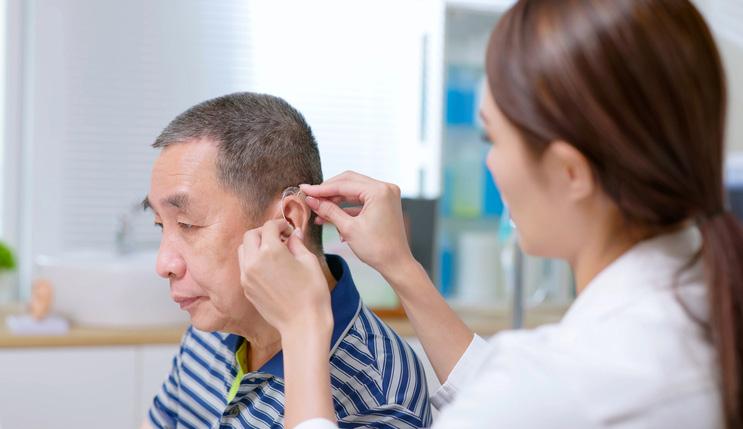
“What many adults with hearing loss tell us is that they can hear people talking, but it’s not always clear,” Dr. Bondurant says. “It might sound like people are mumbling all the time. Those are classic signs of hearing loss in the higher pitches, which is where many of the sounds are found that make speech easier to understand.”
The hearing exam
After discussing your symptoms and family medical history, your hearing specialist will conduct a hearing exam. First, you will undergo a physical examination. Your practitioner will inspect your ears and ear canals for signs of blockage or earwax buildup. Next, you will put on headphones and listen for a series of tones at different volumes. When you hear a tone, you will identify that you heard the sound by raising your hand or tapping your headphone. You may also experience a different test where you’ll listen to a series of words that are spoken at various distances and at different volumes.
“(Today’s hearing aids) are very unobtrusive and cosmetically appealing,” Dr. Bondurant says. “They can provide a great boost in the frequency range where most hearing losses occur.”
There are also behind-the-ear (BTE) hearing aids that have most parts enclosed in a plastic case that rests behind the ear. The case is connected to an earpiece with clear tubing. They are easy to clean and handle. In-the-ear models are larger than behind-the-ear hearing aids.
Completely-in-the-canal (CIC) aids are the smallest option available. They are great for cosmetic reasons but may be difficult to handle due to their small size.
Over-the-counter options
Today, more hearing devices are becoming available without a prescription. While this option may seem convenient, if you suspect you are experiencing hearing loss, you should schedule a hearing exam before selecting an over-the-counter (OTC) hearing aid. Since hearing loss can be attributed to a variety of factors, it is important to receive a correct and comprehensive diagnosis to determine the best route for treatment.
Dr. Bondurant notes OTC hearing aids are only appropriate for mild to moderate hearing loss, and they require the patient to be able to manage their own technology with minimal assistance. Patients have a better experience and better outcomes with prescription hearing aids under the care of a hearing specialist.
Paying for it
Always check with your insurance to determine if it will cover part or all the cost of the hearing aid.
If you are a military veteran, you may be able to secure financial assistance for your hearing aid through your local Veterans Affairs Office. For benefit information, call 215-686-3256 or visit phlVeterans.com.
***
For more information about hearing loss, go to nia.nih.gov and type “hearing loss” in the search function. For information and resources available in the Philadelphia area, contact the Deaf-Hearing Communication Centre at 610-604-0450, option 4 and dhcc. org.
January 2023 Milestones 14
Mary Anna Rodabaugh is a writer, editor and writing coach.
Local health programs available through the Older Americans Act

grams.
Disease prevention and health promotion services now include:
• Screenings, coordination of treatment and other services for fall-related injuries, including traumatic brain injury.
• Evidence-based programs for chronic pain management.
The Older Americans Act (OAA) is an extremely important piece of legislation on behalf of older adults in our country’s history. It funds a wide variety of homeand community-based programs, including many health education, fitness and nutrition programs. Originally passed in 1965, the OAA was last reauthorized as the “Supporting Older Americans Act of 2020” through 2024. Area Agencies on Aging, including Philadelphia Corporation for Aging (PCA) in Philadelphia County, receive funding from the Administration on Community Living at the federal level through the State Units on Aging to implement programs locally. Following are some of the updates that were made to the OAA in 2020.
Person-centered, trauma-informed care takes a holistic approach to providing services that promote dignity, strength and empowerment of trauma victims.
Vaccination promotion provides education and resources for older adult immunizations to prevent infectious diseases.
Programs to reduce malnutrition include education and nutrition screenings.
Programs to prevent sexually transmitted diseases include education and evidence-based health promotion pro-
• Services to address public health emergencies and emerging health threats.
• Suicide risk screening as part of comprehensive mental and behavioral health services.
• Screening and coordination of services and health care to prevent and address negative health effects of social isolation.
Senior community center services promote social connectedness and reduce the negative health effects associated with social isolation as part of comprehensive supportive services.
State and community programs on aging measure impacts related to social determinants of health of older individuals.
Resources
For more about services provided through the Older Americans Act, go to ACL.gov and type “OAA” in the search box. You may also contact PCA at 215-765-9040 or pcaCares.org for programs and services available to older Philadelphians and adults living with disabilities.
CREATORS NEWS SERVICE
Flowering 1 2 3 4 { 5 6 7 8 9 { 10 11 12 13 14 { 15 { 16 17 18 19 { 20 { 21 { { { { 22 23 { 24 { { { 25 26 27 { 28 29 { 30 31 32 33 34 { { 35 36 { 37 38 39 40 41 42 { 43 { { 44 45 46 { 47 48 { 49 { { { 50 51 { 52 53 { { { { 54 55 56 { 57 58 59 { 60 61 62 63 { 64 { 65 66 { 67 { 68 } } } } ACROSS 1 Judge’s bench 5 Empty 10 Cicatr ix 14 Moslem pr ince 15 Tidal bore 16 Hebr ides island 17 Spr ing flower 20 Seven: comb form 21 Cer tain metr ical foot 22 Cans 24 Paradise 25 Naval officer : abbr 28 Locale 30 Roofed passageway 34 Famous Confederate 35 Type of recording 37 As You Like It character 38 Coneflowers 42 Extreme 43 State flower of Utah 44 Gadget for Tom Watson 45 City officials 47 Native of Belgrade 49 Newspaper VIPs 50 Bar k of the paper mulberr y 52 Pull heavily 54 Those preyed upon 57 Japanese city 60 Tor ture devices 63 Helm position 64 Seed used in flavoring 65 One of Jacob’s sons 66 Saucy 67 Cantered 68 Fastener DOWN 1 Unit of sound intensity 2 Fr iends, in France 3 Afr ican river 4 Vault under a church 5 Explicit 6 Rodent 7 Tur kish title 8 Goddess of peace 9 Sagebr ush State 10 Quiets 11 Ar my officers: abbr 12 Dill 13 Beam of light 18 US inventor 19 Glimpsed: Fr 23 Remains 25 Set of records 26 Italian ar tist Luca Robbia 27 Full of substance 29 Fencing foils 31 Winged 32 Ate sumptuously 33 Relaxes 36 Moved sideways 39 Whim or eccentr icity 40 Or iental method of combat 41 Gr ieved 46 Helical 48 Str ike heavily 51 Acid in protein 53 Celts 54 Dell 55 Roman road 56 Clip 58 Shar p 59 Edison’s middle name 60 Lid 61 Compass dir 62 Dr ink slowly
By Neil Manausa
Health Brief
Crossword
Solution: The solution can be found on page 7.
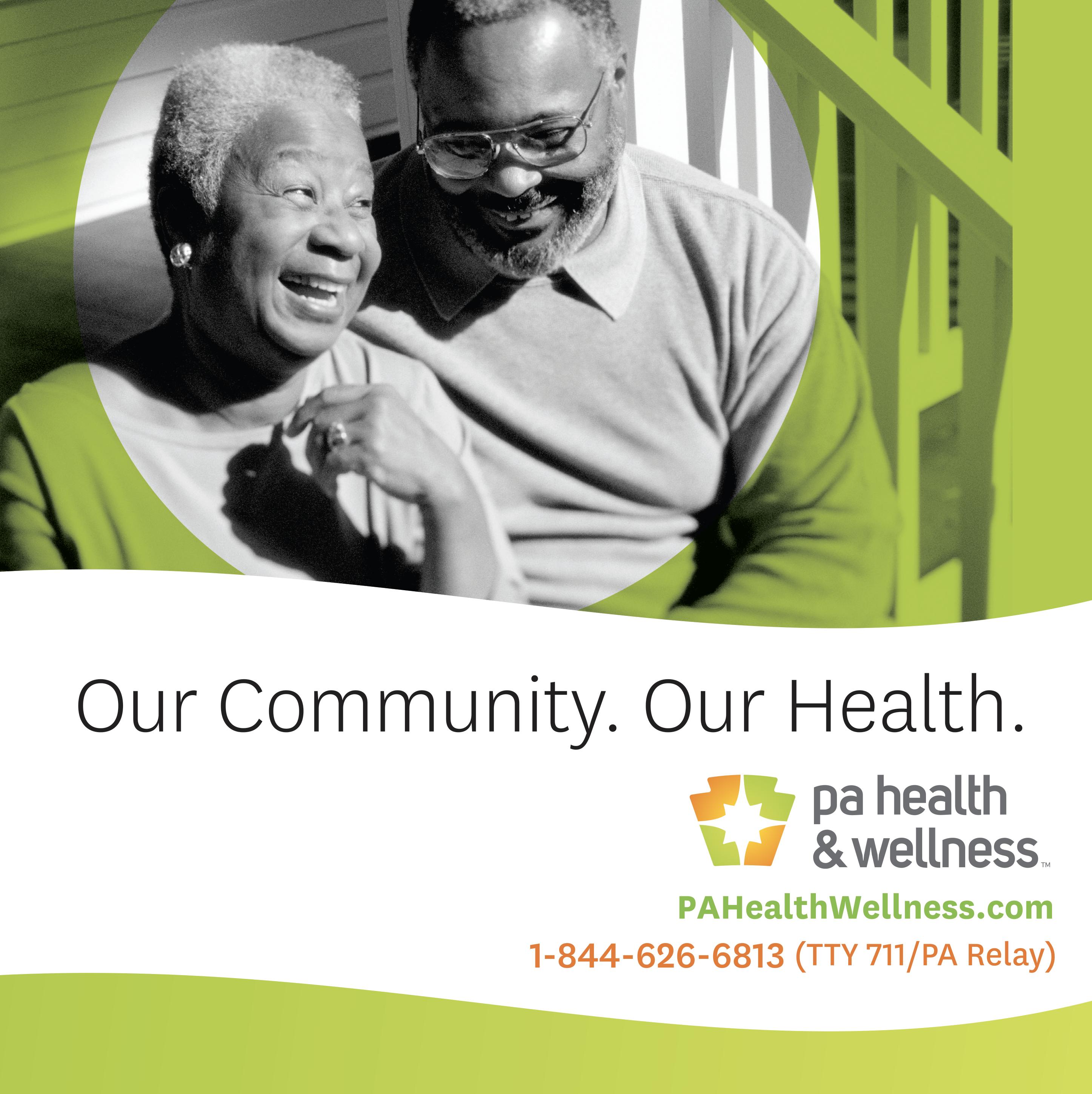


















 By Bill Conallen
By Bill Conallen






















